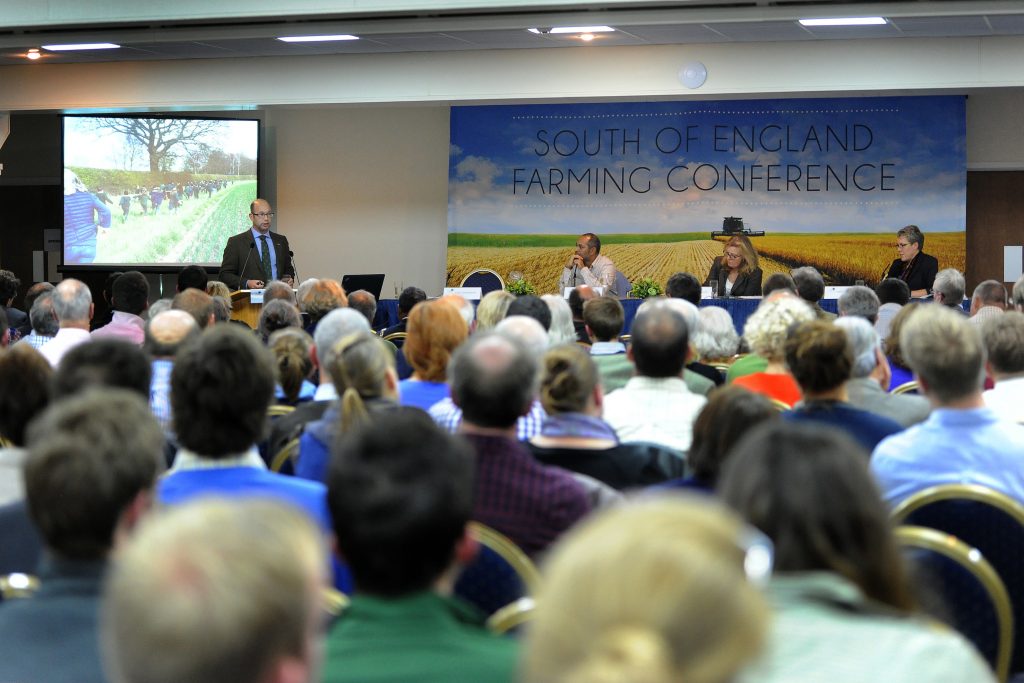Sustainable ideas from South of England Farming Conference
24th November 2016
Over 250 farmers discussed and debated issues around sustainable farming at the South of England Farming Conference in Ardingly this week [November 16], laying bare the stark challenges that face

SEAS Autumn Farming Conference 2016.
Over 250 farmers discussed and debated issues around sustainable farming at the South of England Farming Conference in Ardingly this week [November 16], laying bare the stark challenges that face British farmers today and coming up with creative ideas to address food security for a post-Brexit future.
Chaired by BBC presenter Charlotte Smith, speakers included Helen Browning OBE, chief executive of the Soil Association and organic farmer in Wiltshire; Robin Sundaram, head of responsible sourcing for Nestlé UK; and Jake Freestone, a Nuffield Scholar and farm manager at Overbury Farms in Gloucestershire, farming to the Linking Environment and Farming (LEAF) accreditation.
Doug Jackson, South of England Agricultural Society Trustee, said, “The debate was superb and we have reason to be optimistic that British farmers have the innovative ideas and drive to farm in a sustainable way.
“Our speakers on the night offered some excellent ideas around how to preserve the countryside and our precious natural resources alongside farming and showed that our farmers are already coming up with creative solutions to the problems and issues that we face with a global population to feed which is expected to reach 9.5 billion by 2050.
“We were also delighted with the excellent attendance of farmers and students at our new Technical Forum to share expertise and understanding of soils and farming systems to better improve soil conditions.”
Presenters included Ron Stobart, head of farming system research at NIAB TAG; David Jones from the Natural History Museum who is an expert on worms; and Tom Sewel, Nuffield Scholar and farmer who has embraced a no-till system on his farm in Kent.
One topic high on the agenda was soil management and the importance of nurturing earth worms, with discussion and a sharing of ideas on how to farm organically without tilling and disturbing the soil and instead rotating deep root and cover crops which keep the nutrients and quality of the soil intact and avoid the destruction of earth worms.
Other key issues on the day included questions as to why prices of products, such as milk and grain, were similar to what they were in the 1970s and questions were raised as to why the public and leading retailers are so unwilling to accept an increase in prices for quality food, with suggestions that this could be because of inappropriate marketing or because food is deemed as a commodity. With this in mind, some farmers asked how they could farm sustainably and still make money.
Shocking facts like a third of food in the world is wasted were discussed and innovation was seen as a key solution, which the speakers could demonstrate, using bio-technology and new methods of farming, as well as focusing on the market and growing new products creatively to sell to them.
Duncan Rawson, a Nuffield Scholar sponsored by the South of England Agricultural Society and this year’s Conference Organiser, said, “Farmers are being challenged to produce more food for a growing population but at the same time go further in protecting the environment. Food businesses and retailers have to consider their environmental and social footprint along the entire supply chain and it was good to have the two ends of the chain represented at the conference, including farmers and Nestle.”
The South of England Agricultural Society also announced a travel bursary fund available for farmers wishing to travel and learn good practice through the Society’s International Farmlink scheme and invited farmers to apply.
